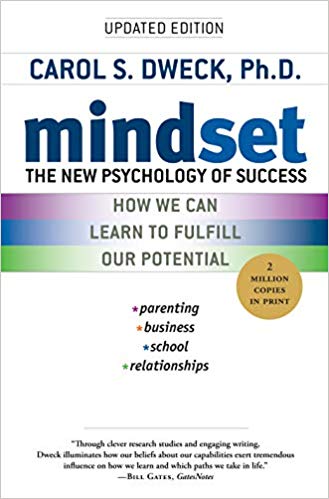

This article is an excerpt from the Shortform summary of "Mindset" by Carol Dweck. Shortform has the world's best summaries of books you should be reading.
Like this article? Sign up for a free trial here .
What are the benefits of a growth mindset? How does a growth mindset help you become more successful at work and in your personal life?
We’ll cover the benefits of a growth mindset. Learn how a growth mindset helps you work harder, become more self-aware, become more successful, bounce back after failure, and remedy depression.
Benefit #1 of a Growth Mindset: It Makes You Put in More Effort
The first benefit of a growth mindset is that it helps you work toward your goals. Stressing persistence and effort isn’t anything new. We have many sayings and stories intended to show the value of effort: Rome wasn’t built in a day; try, try again; “The Little Engine that Could.” However, researchers discovered that people’s beliefs about effort are more complicated. They come directly from mindset.
People with fixed mindsets don’t believe in persistence or effort. They think: If at first you don’t succeed, then you don’t have what it takes. They avoid effort because if you try and fail, you’ll demonstrate your inadequacies, which you want to avoid.
When the researchers encourage people to accept a fixed mindset, in which they believe abilities are predetermined, they’re afraid of challenge and effort that might unmask them. But when people are taught a growth mindset that emphasizes development, they appreciate challenges and value effort.
Benefit #2 of a Growth Mindset: It Increases Self-Awareness
The second benefit of a growth mindset is that it makes you more aware. You might think that people with a growth mindset, who believe they can develop, would have an exaggerated view of their abilities (“I can do anything”). In fact, people with a growth mindset are more realistic about their strengths and weaknesses than those with a fixed mindset.
When you believe you have the capacity to learn, you’re more open to honest feedback and criticism than if you believe you have a finite amount of intelligence. People with a growth mindset understand that you need accurate information about how you’re doing in order to improve. Fixed mindsets distort this information, either blowing it out of proportion or making excuses and minimizing it.
Researchers have found that exceptional people (much like those with a growth mindset) know their strengths and weaknesses, and can turn failures into eventual successes, which is a key element of creativity.
Benefit #3 of a Growth Mindset: It Makes You More Successful
The third benefit of a growth mindset is that it increases your success. When you start out in life, success is about learning. You’re born with a drive to learn. Babies learn and stretch themselves every day. They don’t worry about failing or quit. For instance, they don’t decide walking is too hard and give up or fear falling. They just keep trying.
As early as preschool age, however, children develop mindsets or beliefs about their ability. Fixed mindsets slow or shut down the intense drive to learn. Some children become fearful of not being seen as smart; they begin rejecting challenges. Others, with a growth mindset, embrace challenges and relish becoming smarter. Fixed mindset children become non-learners.
For instance, the author and her research team offered four-year-olds a choice of redoing an easy puzzle or trying a new, harder one. Children who believed in fixed traits wanted to redo the easy puzzle (the safe choice), while children with growth mindsets wondered why anyone would want to keep redoing the same thing when they could try something else. In other words, children with a fixed mindset wanted to make sure they succeeded, as they believed smart people always do, while those with a growth mindset wanted to get smarter.
Over time, people with fixed mindsets and growth mindsets come to view the nature of success differently.
- Fixed-minded people avoid challenges because they want to feel smart and in control. In contrast, growth-minded people thrive on challenge and stretch themselves past their comfort zone.
- Fixed-minded people care about perfection. To feel smart, they not only have to “get it” right away, they have to be perfect at it. In contrast, growth-minded people said they felt smart when they tried hard and made progress or were able to do something they couldn’t do before. Feeling smart was about learning.
- Fixed-minded people expect to immediately perform at high levels, without the need to learn. They don’t allow themselves time to develop or become. As a result, they get frustrated by failure and give up early. In contrast, growth-minded people expect to need to put in lots of time and effort to get better at things, and are thus more resistant to failure.
- Fixed-minded people prefer to be validated by others as capable, to be seen as geniuses. In contrast, growth-minded people aren’t afraid to acknowledge a need to learn through questioning and receiving critical feedback.
Benefit #4 of a Growth Mindset: It Helps You Confront Failure
The fourth benefit of a growth mindset is that it helps you cope with, and learn from, failure. Mindset drives how people define and cope with failure. For people with a fixed mindset, failure is an identity that they fear and try to avoid, rather than something that happens.
For example, as a child, the author refused to participate in spelling and French competitions, although she excelled at those subjects, because she was afraid of losing and being defined as a failure. Golfer Ernie Els felt the same way. When he won a tournament for the first time in five years, he explained what had been at stake: he said that if he had lost again, he’d have become a different person in his mind — a permanent loser. Similarly, every spring, thousands of young people feel they’re failures when they get rejection letters from their top choices for college.
Failure is hard for growth-minded people too, but they don’t let it define them. They see it as something to confront and learn from. For example, Minnesota Viking Jim Marshall didn’t let a spectacular failure define him. He grabbed a loose ball and ran into the wrong end zone, scoring for the opposing team, the 49ers, on national television. Rather than sitting out the rest of the game and feeling ashamed, he went back in and played well during the second half, contributing to a win for his team. After the game, he continued to use the experience in a positive way, answering letters and speaking to groups about coping with failure, while he also worked to improve as a player.
In contrast, confronting failure with a fixed mindset doesn’t give you any constructive way to overcome it. When you’re a failure, then what? Some of the negative ways people with a fixed mindset try to shore up their self-esteem include giving up, cheating, and blaming.
Researchers asked seventh graders how they’d respond to a poor grade on a test in a new course. Predictably, the growth-minded students said they’d study harder for the next one. But the fixed-mindset students said they’d study less — because what’s the point if you lack the ability? Instead, they said they’d consider cheating.
Sometimes, people with fixed mindsets try to make themselves feel better by focusing on others who are worse off. In a college study, researchers allowed students who did poorly on a test to look at others’ tests. Those with a growth mindset looked at the tests of others who’d done better because they were looking for ways to improve. Students with a fixed mindset looked at the tests of those who’d done worse in order to feel better about themselves.
Alternatively, people with fixed mindsets may blame others or make excuses. Every time he lost a match, John McEnroe had an excuse — he had a backache, he overtrained, he ate before the match, or he was a victim of unfair expectations. In contrast, when growth-minded CEO of General Electric Jack Welch made poor decisions leading to poor results, he personally phoned top colleagues to deliver the news and take the blame.
As UCLA basketball coach John Wooden noted, you can’t learn from your failures if you deny them by blaming someone else.
Benefit #5 of a Growth Mindset: It Helps You Cope with Depression
Finally, the fifth benefit of a growth mindset is that it can help your mental health. Mindset plays a role in how people handle depression. In a study of college students, those with a fixed mindset had worse depression than those with a growth mindset. The fixed-mindset students obsessed over problems and failures, which made them feel worthless. The more depressed they felt, the more paralyzed they became — they didn’t do anything to address their problems, such as doing class assignments or studying. In contrast, the more depressed that growth-minded students felt, the more determined they were to take action. They tried harder to keep up with their classwork and obligations.
———End of Preview———

Like what you just read? Read the rest of the world's best summary of "Mindset" at Shortform . Learn the book's critical concepts in 20 minutes or less .
Here's what you'll find in our full Mindset summary :
- The difference between a growth and a fixed mindset
- How a fixed mindset keeps you back throughout your life: education, relationships, and career
- The 7 key ways to build a growth mindset for yourself






